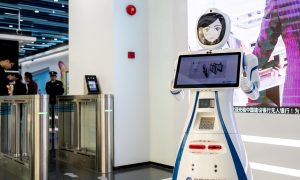 Like many of us, I bank online. On Sunday afternoon, having recently switched accounts, I sat in the back garden, squinted into my tablet against the glare of the sun, and checked my statement against a mound of receipts. I then ordered a new credit card and set up a savings account. The whole lot (including opening the new account and switching from my previous bank) was done without setting foot in a branch. It suited me. And sitting in the sun took the sting out of an otherwise boring chore.
Like many of us, I bank online. On Sunday afternoon, having recently switched accounts, I sat in the back garden, squinted into my tablet against the glare of the sun, and checked my statement against a mound of receipts. I then ordered a new credit card and set up a savings account. The whole lot (including opening the new account and switching from my previous bank) was done without setting foot in a branch. It suited me. And sitting in the sun took the sting out of an otherwise boring chore.
There is no doubt I’m part of the reason why RBS is planning to shut 62 branches in remote and rural communities across Scotland. Digital banking suits me. I like being able to open an app to check my balance, transfer funds to a friend or pay a bill, and I like having the freedom to deal with my financial affairs wherever and whenever the notion strikes. It’s quick and convenient. But then I live in the centre of Inverness, with a smart phone in my pocket, a tablet in my bag and a laptop on my desk. I have 24/7 access to Wi-Fi, or at the least 4G, and I’m comfortable using the technology. There’s also a branch if I need it as back-up.
That’s not the same for many members of the communities who are facing branch closures. For some, digital banking is simply not an option; there’s a lack of access to technology, a lack of connectivity and, for cash-based businesses, making deposits is impossible without a branch.
But it’s more than that. A bank branch is a focal point for many communities, as important as a post office or a school. It’s a reason for people to visit a village, and while there, pop into the shops and cafes next door. Busy high streets attract other businesses and services and keep communities alive. They offer employment. An unreliable mobile van pulling up for half an hour every second Tuesday is hardly equivalent.
There was outcry in January when RBS made their closure announcement. Back then there was some understanding of the economic forces at work. The bank claimed it would save £9.5m a year by closing those branches, branches which, it asserted, were hardly used any more. But any sympathy in the bank’s direction vanished with the recent announcement that RBS – still majority owned by the British taxpayer – reported a £792m profit in the first three months of 2018.
The bank’s alleged £9.5m of savings are a drop in the ocean compared to these profits and the economic and social impact of the closures in the communities they serve will be hard to measure. Once the heart goes out of a community it’s hard to get is back. There’s not a single branch left in Speyside, which leaves people driving miles to fulfil their banking needs.
Not surprisingly, local MPs are urging RBS to call a halt to proposed closures, and demanding that the government step in. Sadly, the demands are falling on deaf ears; RBS reiterated that the bank is “replacing traditional bricks and mortar branches with alternative ways to bank so that we can reach even more customers.” That’ll be the unreliable mobile van then…
 The bank’s words will be cold comfort to the customers who find themselves without a service. But could a solution lie in China? The world’s first human-free branch has just opened in Shanghai, ‘staffed’ by Xiao Long, or ‘Little Dragon’, the guardian of the branch. She welcomes customers, answers simple questions and accepts bank cards and verifies accounts. After a quick ‘chat’ with her, customers pass through doors which operate through a combination of PIN pad security and facial recognition, to reach an army of automatic teller machines. There they can make deposits, transfer money or complete foreign currency exchange, and – if they need to – chat to a real human being via video conferencing.
The bank’s words will be cold comfort to the customers who find themselves without a service. But could a solution lie in China? The world’s first human-free branch has just opened in Shanghai, ‘staffed’ by Xiao Long, or ‘Little Dragon’, the guardian of the branch. She welcomes customers, answers simple questions and accepts bank cards and verifies accounts. After a quick ‘chat’ with her, customers pass through doors which operate through a combination of PIN pad security and facial recognition, to reach an army of automatic teller machines. There they can make deposits, transfer money or complete foreign currency exchange, and – if they need to – chat to a real human being via video conferencing.
If not the full robot experience, then why not a similar technology-based half-way house for remote branches here? We already scan our own supermarket shopping and book theatre and cinema tickets and holidays online, why not something similar for our banks too? Video conferencing and automated banking is never going to be as good as a real human, five days a week, but if the bank believes its own advertising strapline; “We’re here to support you through all your life journeys” then it needs to start showing it.



